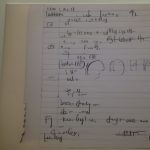8 Ways Academic Writing Can Go Wrong
Academic writing is a skill that every student will need to achieve some level of proficiency before they can excel in the real world. Being able to do it effectively puts you on the same plane as your peers and professional colleagues, and it helps you with a number of functions that we’re about to go over. First, however, let’s ask a simple question:
What Is Writing Academically?
There are some myths that persist about academic writing. And it’s true that some of the work products haven’t done a lot to dispel those myths. We’ve all read so-called academic writing that has been terribly boring before, right? Well, let’s look at what it is and what it isn’t followed by some common examples of academic writing at work.
What It Is
Writing academically is a form of prose non-fiction that’s done with a scholarly approach. By that, we mean the writer is going to use evidence to support assertions and points of view for a variety of purposes that we’ll get into in a moment.
What It Is Not
Academic writing is not writing designed to be boring. It is not writing that intentionally uses big words when it doesn’t make sense simply to “sound smart.” Of course, there are academic works that are pretentious and break this rule, but those works are generally not respected in the academic world.
Why It Is Important for You to Learn
Academic writing may not seem particularly beneficial to you if you plan on going into a skill-based career, but that actually couldn’t be further from the truth. The greater your expertise, the more you’ll need to be able to communicate that expertise on a high level to hit certain career milestones. Here are some of the more specific reasons you need to learn it.
It Helps You Explain Difficult Concepts
As you move into complex professions like law enforcement, engineering, information technology, etc., you’ll be tasked with clearly and unmistakably explaining the challenging concepts that you encounter on a daily basis. This means writing less based on feelings and more based on what you can see, taste, touch, smell, and hear.
It Encourages Use of Concrete Language
To go along with that last sentence, academic writing does not allow you to make assertions without backing them up. You have to be able to paint a picture with words for your audience to “get” what you’re talking about. By the time you’re done learning how to write academically, you’ll be a lot less, “The subject appeared intoxicated,” and more, “The subject slurred his speech and stumbled on the first step of his field sobriety test.”
It Deepens the Relationship Between Cause and Effect
One frequent tool that you’ll need to use when putting together academic writing is the ability to show cause and effect between events and relationships. For the reader to follow where you’re going with an assertion, they will need to see the logic of how one thing builds on another. Academic writing forces you to use this tool frequently.
It Helps You Persuade
Academic writing, ultimately, is about persuasive writing. You have a thesis or viewpoint you need to communicate to an audience, and the methods of writing you use in conveying that and “winning” them to your side will need to be compelling. Think of it like a debate on paper, and you’ll be well on your way to being able to explain and defend your viewpoints better.
Now that we’ve covered the value of academic writing, it’s time for us to discuss all the ways it can (possibly) go wrong. Avoid these mishaps at all costs!
1. Not Understanding Whom You Are Writing For
Before you write a single word, you need to consider whom the people will be reading it. In high school, you probably stop at “my teacher,” but by the time you’re in college, you need to realize what you’re training for. Your professor may be the only one reading what you write, but you have to look beyond him. What if this was “for real”? Who would your audience be at that point? Hint: it’s the people in your professional circumference.
2. Failing to Read
Great writing of any kind starts with great reading. When a person wants to write a novel, the best thing they can do is read other novels to see how the pros do it. The same is true of academic writing. Pick out great academic works that are relevant to your subject matter, but don’t stop there. Look at how books are structured in their tables of contents. From there, read a chapter and break down what each paragraph in that chapter accomplishes.
3. Rambling
Academic writing can go bad in a hurry if you’re treating it like a random document that has to meet a specific word count. This can lead to stream-of-consciousness forays that go nowhere and crowd out the actual substance of your writing. It’s also not fooling anyone, and your audience will rebel against you when they notice that you’re doing it.
4. Allowing Your Internal Editor Free Reign
This might seem a tad contradictory, but hear us out. No, you’re not supposed to just ramble on with the prose equivalent of diarrhea of the mouth. But at the same time, you can’t afford to let your internal editor rule the roost in those early stages of development. The writing you do in an early draft should almost never be stopped or second-guessed for any reason. That’s because you need the flowstate in order to move your ideas along. If you’re constantly pausing to reflect on the sentences you’ve just written, you’ll suck any chance of fun or passion out of the project right away.
5. Being Needlessly Verbose
By this, we mean word choice. Don’t go for bigger words just because you think they make you “sound smarter.” They don’t. And they annoy the reader.
6. Ignoring Reading Levels
Academic writing usually does clock in at a higher reading level than the usual prose writing. Take the average bestseller. It’s written for people at a 5th to 7th-Grade reading level. That doesn’t make the writing overly simplistic at all. You’ll observe this as it sucks you into its world and tension. But it does mean that the writing should be accessible to most common readers.
If writing academically, don’t make the mistake of thinking you have to be on the other end of the spectrum (in the 11th and 12th-Grade range). Ideally, you’ll want to go no higher up than a 9th-Grade level. To ensure you’re hitting those goals, we recommend throwing each draft through the HemingwayApp. It’s free, and it can tell you instantly what your problem areas are.
7. Glossing Over Spelling, Grammar, and Usage
There is really no excuse for this one anymore. There are enough great (and free) programs out there that go well beyond what your word processor’s SpellCheck feature will do. Grammarly and AutoCrit are two such examples, as well as the aforementioned HemingwayApp. With a simple copy and paste, you can take care of most of your problems, provided you’re hovering over each potential problem area and making the subsequent changes.
But do yourself a favor if using these programs. Stop one last time before moving on and read your paper aloud. This “forces” you to hear what you’ve written and actually say it instead of reading it the way it appears in your head. For bonus points, start at the last sentence and read your paper backwards to ensure that each sentence flows well into the next.
8. Writing About Something You Hate
Many students doom their academic writing pursuits early on by choosing a subject they can’t embrace. If the topic does nothing to move your interests, you’re going to feel like you’re slogging through every part of the writing, from research and first drafts to final drafts and polishes.
You don’t have to enjoy the writing process, but you do need to choose something you can live with. Put a lot of effort into finding something that’ll get you there, and you’ll be able to do the hard work needed to get through the assignment. Otherwise, it’s going to be a long semester.
Academic Writing Does Not Have to Be Dull and Boring
We hope that this look at academic writing mistakes will keep you from making them. We also hope that you invest yourself in the topic creation process and give yourself enough space from your perfectionist tendencies to get great ideas down on paper. From there, you can work on perfecting them.
Now it’s your turn, readers. What are some of the best academic writing tips that have helped you in your coursework? Share in the comments section below.
[Featured Image by PxHere]








